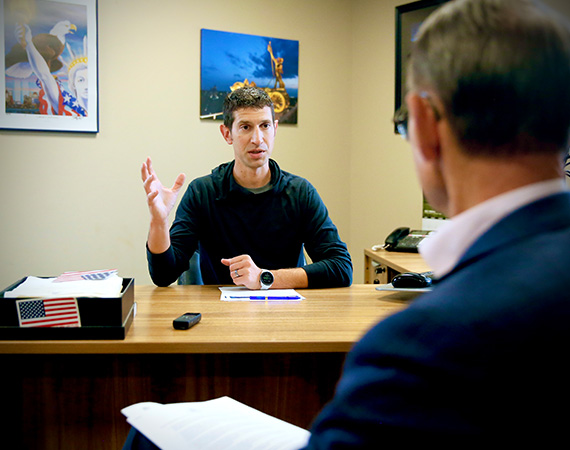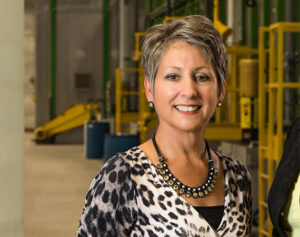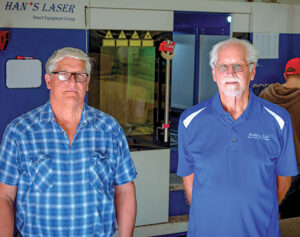Sen. Jeremy Miller, Minnesota’s newly named Senate Majority Leader, is the first manufacturer to serve in this position. The co-owner of William Miller Scrap Iron & Metal Company, a family business based in Winona, he brings a first-hand understanding of how the COVID-era economy has confronted manufacturers with particular challenges and opportunities.
Bob Kill, Enterprise Minnesota’s president and CEO, sat down with Sen. Miller to discuss the findings in this year’s State of Manufacturing survey and get his perspective on the concerns voiced by manufacturers. Miller also provided his take on the issues and challenges that may arise in the upcoming legislative session beginning on January 31, 2022.
Kill: Sen. Miller, the last time we were in your office was about two years ago. Today, we’d like to talk to you a bit about manufacturing, and the successes and challenges the industry faces. We’d like to get your thoughts and perspectives on manufacturing and the industry’s position as one of the backbones of Minnesota’s economy.
Miller: I’m hearing from employers throughout my district — from manufacturing to long-term care facilities to the food and beverage industry — and they’re all having the same issues. I think you must look at each challenge, how it affects that industry, and how it affects our community and business environment. We are all impacted.
The real question is, how can we keep these things from remaining an ongoing problem? If we can find ways to improve just one of these challenges, maybe that can help us build on that success as we tackle the other problems.
I think the one thing that prepares me best for my role in the legislature is my small business background in manufacturing. There are many topics that we deal with, from regulatory issues to taxes to employment issues. My experience will be helpful when discussions about those issues come up.
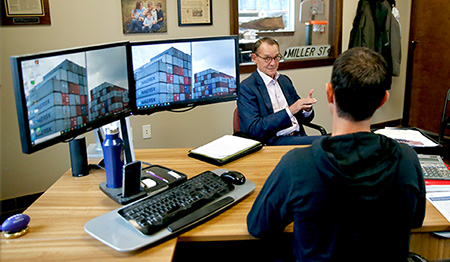
You come from manufacturing. You know many manufacturers around here, and they all know you and your organization. How will that sharpen the ideas you bring to this new leadership position?
Miller: My experience is in the scrap and recycling industry, and that’s certainly a nontraditional type of manufacturing, but it is manufacturing. Our business is sort of at the end and the beginning of the supply chain for many manufacturers.
In the legislature, there are many topics that we deal with, from regulatory to taxes to employment issues. My background should be helpful in those discussions.
As part of our 13th annual State of Manufacturing survey, which we just completed, we spoke with about 500 manufacturers and held 13 focus groups all around the state. We discussed the challenges manufacturers face, including those in their workforce. What kind of issues come to mind pre-COVID, and maybe some of the issues that were caused by COVID?
Miller: Certainly workforce and labor shortages are an issue across the board, regardless of what industry it is. Those have been the big challenges in the last year. They were starting to be a challenge pre-COVID, and they’ve continued to be a challenge. We hope we’re moving beyond COVID now, but they could become an even bigger challenge. One of the reasons is that the government, especially the federal government, offered so many incentives for people not to work.
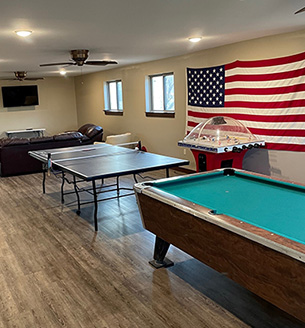
In my view, it should be the exact opposite. The federal government should be providing incentives for people to go back to work. I think that’s first and foremost one of the things government can do to improve the labor shortage. The workforce issues that companies are facing across the board should be dealt with at the state and federal level.
I was touring a long-term care facility recently. They’re dealing with a very interesting situation. They’re getting applications, but many of the people who apply have absolutely no intention of working. Most won’t even return a phone call or show up for an interview. They apply just to maintain unemployment benefits. That tells me that the system is broken, and it needs to be reformed. I think that’s something good that can come out of the COVID pandemic. What we’ve learned can help us re-evaluate what works and what’s broken. One repair might be to provide more incentives for people to work instead of offering money not to work.
When you think about that senior housing situation, and as a manufacturer and employer, do you think this workforce challenge will impair future growth?
Miller: The long-term care situation was just one of many examples I’m hearing. Employers throughout the communities I represent tell me that workforce issues are a major concern. Whether the industry is long-term health care, food and beverage hospitality, retail, or manufacturing, you name it. They’re all having the same issues.
I believe every challenge creates opportunity. There’s no doubt COVID has been a challenge for everyone, but it also presents opportunity, and I always try to look for opportunities. We must ask ourselves how we can improve on what we’ve been doing well.
We’re trying to take employee care to a whole new level too by paying very competitive wages with top-notch benefits. We pay for 100% of employees’ health care. Our retirement plan is great. We have paid time off and there are several other ways we can provide incentives for employees. We’re always trying to find ways to do more for workers. I think employers across the board are trying to do more. They want to bring on new workers, but they know it’s important to take care of the employees they have so they don’t lose them.
There are several very small communities in your district, but the district is thriving. How have industries throughout the district been impacted by wage inflation, and all the other issues? Is the competition of getting above a positive, livable wage becoming a challenge?
Miller: It’s always a good idea to let the free market work. When we debate bills at the legislature, we try to look at the short- and long-term benefits programs offer. Several bills trying to increase the minimum wage have been introduced. My view is that the free market is working. Wages are naturally increasing. There are only so many workers, and manufacturers are competing for them. A worker can leave one employer and go to another. That’s not helping the workforce issue. We need more people. Manufacturers are busy, but we must find ways to help them bring in workers.
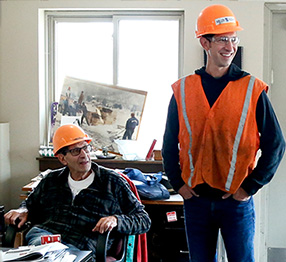
This COVID pandemic has been challenging, especially in Greater Minnesota. Down here in southeastern Minnesota there are only so many workers. Companies are competing for the same workers. Workers can easily go from one employer to another, and that’s not necessarily helping companies address their labor issues. We need more workers. We’re busy and that’s a good thing. Our challenge is figuring out the best ways to bring more people into the workforce to fulfill the need. Consistently improving incentives might not be the best long-term answer for the industry.
You represent a unique community in southeast Minnesota, with both a two-year technical college and four-year colleges. Does that help your community?
Miller: Winona is a higher education hub. I think the technical and community college can play a major role in the advancement of manufacturing. I think technical colleges could adapt a bit quicker than the four-year schools to the workforce need. One thing that is positive is that the technical college and four-year schools all have great relationships with manufacturers and other employers, as well as the Winona Area Chamber of Commerce. Those relationships are good for every employer in the region.
Any thoughts on how technical schools can help advance manufacturing?
Miller: They’ve already developed a lot of partnerships, both with the high schools and area employers, including the small, medium, and large companies.
There are ongoing discussions. I think those will be important for our area’s institutions, especially the technical college. How do you help advance manufacturing? You collaborate. You build partnerships and you work together with people in the community to meet the needs of employers and potential employees.
I think those relationships are important. They help the schools, the businesses and the community adapt and improve. That can help us do a better job of meeting the needs of the employers and their employees.
Do you sense that manufacturers are looking at technological advancements and automation more now than before COVID?
Miller: Manufacturers have been forced to examine those options. I don’t think that’s a bad thing. As I said before, every challenge presents an opportunity. Any business that looks at this as an opportunity to explore automation is doing the correct thing. Just because you’ve done something one way for many years doesn’t mean you can’t adapt and change and find a way to do it better and more effectively. I think companies are going to investigate technology more and more, especially in manufacturing.
The pandemic forced many companies to look at all their options. How do you do more with less? One option is improving technology. I think you’re going to see more manufacturers looking into that.
The early stage of our survey said manufacturers are bullish about their companies. It also told us that they’re feeling challenged by some of the things happening with the economy. Any thoughts on what those concerns, other than COVID, might be that are outside of their control?
Miller: I’m concerned about the cost of doing business. It’s getting more expensive, and that’s a result of some of the things being discussed at the federal level, including higher taxes and additional regulatory burdens. Inflation is a real thing that is going to affect all of us, whether we’re an individual or a company. Look no further than your last trip to the gas station or grocery store. We’re paying more and getting less in return. Costs are getting passed on to the consumer. How much can we take? So, I’m concerned. I think the outlook is strong, but these things are going to weigh us down, and we won’t be as strong as we need to be. Many of those things are a result of what’s coming down from the federal government.
Manufacturers are saying that the business climate in Minnesota is more challenging now and less positive than it was five years ago.
Miller: That opinion is very concerning to me. If folks feel the business climate is worse, we need to do something to figure out why they’re saying that. We need to work together to find solutions. The legislature has done several things to provide tax relief for businesses and individuals, and we’ve done several things to hold the line on regulatory burdens. I believe we must do more to create a pro-business environment.
We’re all dealing with COVID-related issues, and the labor shortage. We must figure out how to work together and pursue solutions.
There probably isn’t a short-term fix. I look at what the Winona Area Chamber of Commerce did. They have a Reach Program, which allows them to work with manufacturers throughout their community. With that program, they bring students to manufacturers. That gives students hands-on learning experiences, and many of them walk away with a renewed interest in the industry. That is a way to engage students and show them there are career options beyond a four-year education.
That partnership can be incredibly valuable for the business and the students, and it might be a step toward a solution to some of the labor shortages we’re seeing. By getting these potential employees into the businesses, seeing the job options, we can provide them with a new perspective for their future options. Programs like that create a win-win. Sometimes, it’s about being creative.
That’s a good lead into another topic we’d like you to comment on. We’ve preached for a long time that the technical schools and manufacturers must work together. If you look back a decade, they certainly are working together more aggressively today. One of the challenges is helping manufacturers get their stories across to elected officials. They feel as if they’ve been ignored. They feel they are an industry that provides a livable wage and more should be done by elected officials to help them. Is there anything more that can be done to make manufacturing more visible to elected officials?
Miller: Manufacturing is the strength of our economy. That’s true not only in Minnesota but across the country. I’ve always said that farming and agriculture provide the heartbeat of our economy, and manufacturing provides the strength.
I find it very concerning that manufacturers don’t think their voices are being heard. I’m guessing a lot of this has to do with COVID. Frontline workers have been working incredibly hard, and they’re not getting the attention they deserve. They’ve taken risks to keep other people safe. Manufacturers have been right there too, doing whatever they can to keep the economy moving. They deserve a tremendous amount of credit. I would encourage manufacturers to reach out to elected officials — at the local, state, and federal levels — and tell them how important the industry is to our economy and society.
Encourage them to have meetings, provide tours, and do whatever they can to help their legislators understand how important manufacturing is.
How about cybersecurity? We hear about it more when the bigger companies get hacked, and less when a smaller company gets hacked, but it’s going on all the time. Is there anything that can be done in the legislature to help small companies? They’re just as vulnerable as larger companies.
Miller: Cybersecurity is very important, and very serious. I believe a group of legislators are working on cybersecurity. I don’t know what can be done to help small businesses defend themselves in cybersecurity issues, but I believe we should have more conversation about it.
Is there anything else you would like to tell us about your experience as both a manufacturer and a legislator and how you view the upcoming session?
Miller: When you look at manufacturing in Minnesota, you see a big difference in the legislative districts. My district probably has more manufacturers per capita than anywhere else in the state. Then there are those districts where you would have trouble finding one or two manufacturers. That makes manufacturing less important for the legislators from those districts.
I mentioned it before, but manufacturing is very important to Minnesota’s economy, and there are important topics across the board that have to be addressed. You can’t have manufacturers who aren’t operating at full capacity. It’s important to talk about what’s happening. If there are reasonable proposals out there that address the workforce and supply chain issues, we have to explore them.
With everything going on in our economy and the dynamics in the legislature, this is going to be a difficult session. Employers don’t need more mandates. There is a tremendous amount of mandate fatigue, and not only because of COVID. This next legislative session worries me because of all these issues.
I think there are some good things the legislature could get done this next session, but I think it’s just as important to play defense. I think it’s very helpful for the legislature to understand how important small business manufacturing is for our state. I believe my experience and background can help other legislators understand the key role manufacturing plays in Minnesota.
…
Featured story in the Winter 2021 issue of Enterprise Minnesota magazine.
